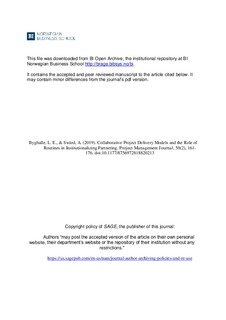| dc.contributor.author | Bygballe, Lena Elisabeth | |
| dc.contributor.author | Swärd, Anna | |
| dc.date.accessioned | 2019-07-01T13:24:47Z | |
| dc.date.available | 2019-07-01T13:24:47Z | |
| dc.date.created | 2019-02-14T10:56:09Z | |
| dc.date.issued | 2019 | |
| dc.identifier.citation | Project Management Journal. 2019, 50 (2), 1-16. | nb_NO |
| dc.identifier.issn | 8756-9728 | |
| dc.identifier.uri | http://hdl.handle.net/11250/2603078 | |
| dc.description.abstract | It is widely held that collaborative project delivery models, such as partnering, represent a key means of improving construction project performance. Institutionalizing these models in practice, however, is not straightforward. We suggest that the (in)ability to establish new routines may be one reason for the variance in partnering outcomes. Based on a study of a partnering project, we develop a model of how partnering is institutionalized through the establishment of routines, enabled through common understanding and truces between the partners’ interests. The model illustrates how such routines develop through a balance between top-down structural interventions and emergent social learning processes. | nb_NO |
| dc.language.iso | eng | nb_NO |
| dc.publisher | Sage | nb_NO |
| dc.title | Collaborative Project Delivery Models and the Role of Routines in Institutionalizing Partnering | nb_NO |
| dc.type | Journal article | nb_NO |
| dc.type | Peer reviewed | nb_NO |
| dc.description.version | acceptedVersion | nb_NO |
| dc.source.pagenumber | 1-16 | nb_NO |
| dc.source.volume | 50 | nb_NO |
| dc.source.journal | Project Management Journal | nb_NO |
| dc.source.issue | 2 | nb_NO |
| dc.identifier.doi | 10.1177/8756972818820213 | |
| dc.identifier.cristin | 1677307 | |
| cristin.unitcode | 158,8,0,0 | |
| cristin.unitname | Institutt for strategi og entreprenørskap | |
| cristin.ispublished | true | |
| cristin.fulltext | original | |
| cristin.fulltext | postprint | |
| cristin.qualitycode | 1 | |
